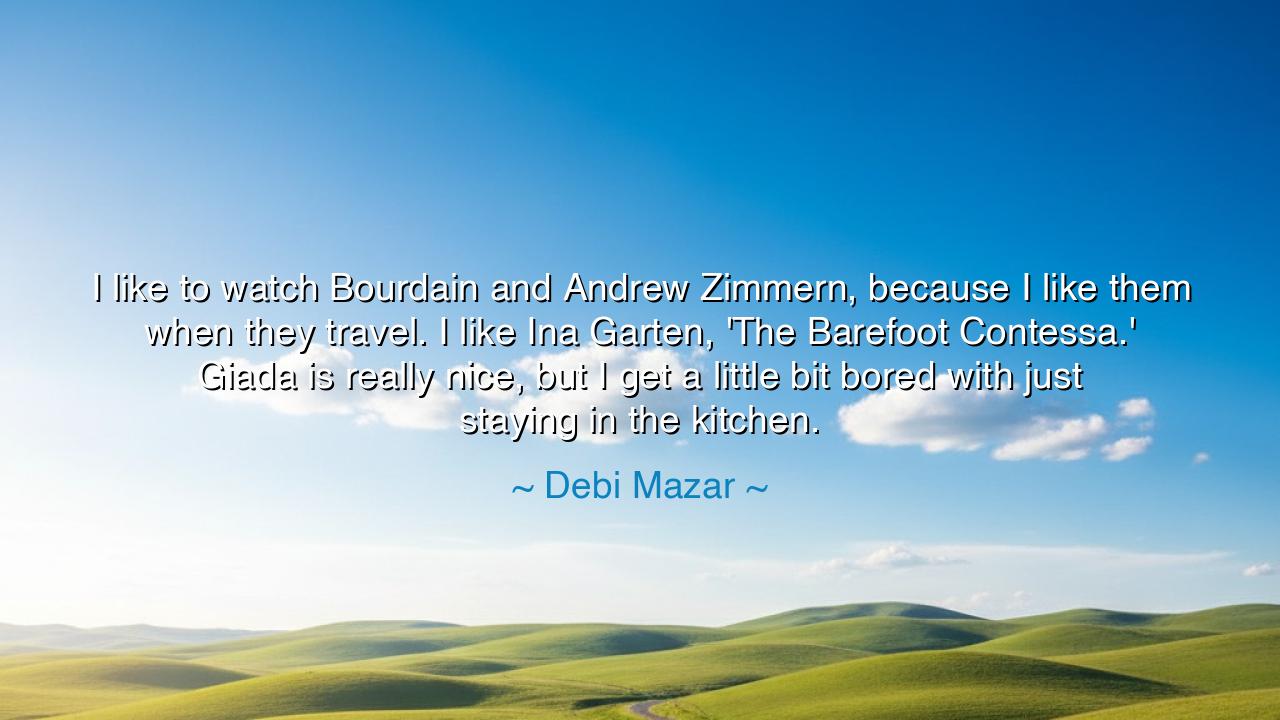
I like to watch Bourdain and Andrew Zimmern, because I like them
I like to watch Bourdain and Andrew Zimmern, because I like them when they travel. I like Ina Garten, 'The Barefoot Contessa.' Giada is really nice, but I get a little bit bored with just staying in the kitchen.






In the words of Debi Mazar, “I like to watch Bourdain and Andrew Zimmern, because I like them when they travel. I like Ina Garten, ‘The Barefoot Contessa.’ Giada is really nice, but I get a little bit bored with just staying in the kitchen,” we hear more than the musings of one who enjoys food and its heralds. We hear the cry of the soul against confinement, the yearning for movement, for journey, for discovery beyond walls. To cook is noble, for it nourishes; but to travel is divine, for it nourishes the spirit with stories, peoples, landscapes, and the ever-changing face of the earth.
The ancients knew this truth well: that wisdom is gathered not only in hearth and home, but on the road, where the winds of other lands touch the skin, and the tongue learns the taste of strange spices, and the eyes witness the unending diversity of creation. The heroes of old did not sit long by the fire; they set sail upon treacherous seas, crossed deserts on foot, ascended mountains no man had yet dared. For they knew that the soul grows restless if it is kept in one place. Mazar’s confession, that she tires of “just staying in the kitchen,” echoes this heroic restlessness—the refusal to let life shrink to the walls of a single room.
Think of Anthony Bourdain, the traveler of our age, who turned meals into gateways of human connection. His journeys were not only about food, but about faces and stories—about breaking bread with strangers and discovering kinship in the unlikeliest corners of the world. To watch him, as Mazar did, was to be reminded that the earth is vast, and that every table, whether in Hanoi or Buenos Aires, is a map of the human heart. He showed us that travel transforms the simple act of eating into communion.
Yet there is balance in her words as well. Mazar honors Ina Garten, the Barefoot Contessa, and Giada De Laurentiis, who shine not through distant voyages, but through the intimacy of the kitchen. Their gift is to remind us that home, too, is a sacred space, where food becomes love and nourishment, and where traditions are preserved. But even as she respects their art, Mazar admits that her spirit grows restless if bound only to that realm. Thus she declares: the hearth must be joined to the horizon. Without travel, the soul stagnates; without the hearth, the soul wanders without root.
History shows us this dance between home and journey. Consider Marco Polo, who left the hearths of Venice to tread the roads of China. His travels brought back not only silk and spice but stories that forever broadened the vision of Europe. And yet, his discoveries would have meant little had he not returned home to share them. The road and the kitchen, the journey and the hearth, must each breathe into the other, or both lose their fire.
The lesson is clear: seek both rootedness and adventure. Delight in the warmth of your own kitchen, in the meals that bind family and friends together, but do not let the walls become your only world. When you feel the tug of curiosity, answer it. Walk the streets of your own city as if they were foreign lands. Speak to strangers. Taste food that is unfamiliar. Let the world feed you, even as you feed yourself and others.
Practically, this means stepping beyond the habits that lull you. If you love cooking, travel to a place where the ingredients are different and learn from those who prepare them. If you cannot journey far, then explore the markets of your town, find dishes from distant cultures, and allow them to stretch your spirit. For the kitchen is not only a room—it is a threshold to the world, if only you open it.
Thus, Mazar’s words remind us that life is richest when it blends the comfort of the hearth with the wonder of the horizon. Let us eat at our own tables with gratitude, but also walk beyond them with courage. For it is in the union of both—the warmth of home and the adventure of the road—that the soul is fed to fullness.






AAdministratorAdministrator
Welcome, honored guests. Please leave a comment, we will respond soon